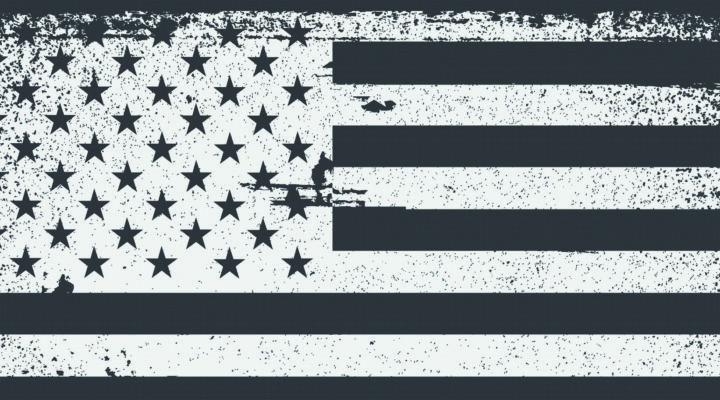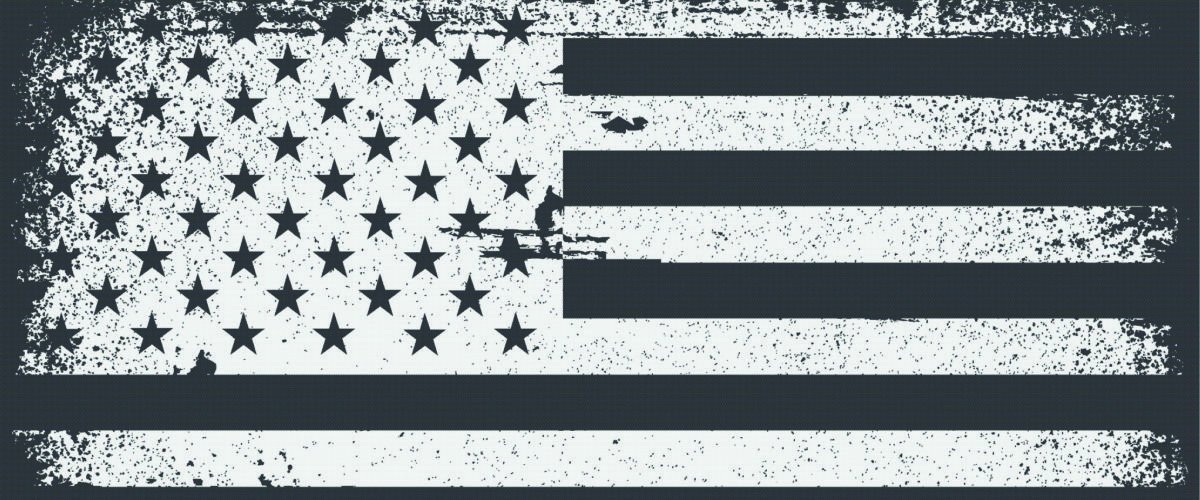Recent attacks against Critical Race Theory are simply the latest expression of the white Christian nationalism that also inspired the Jan. 6 insurrection on Capitol Hill and subsequent voter-suppression efforts around the nation, writer and historian Kristin Kobes Du Mez said during an Aug. 18 webinar.
“It did not come out of nowhere,” Du Mez, author of Jesus and John Wayne: How White Evangelicals Corrupted a Faith and Fractured a Nation, said of evangelical assaults on Critical Race Theory, a legal theory that racism is perpetuated in part through the nation’s system of laws and policies.

Kristin Kobes Du Mez
She spoke at the first of two sessions focused on Christian nationalism and hosted by the Center for the Study of Religion and American Culture at Indiana University-Purdue University Indianapolis. Du Mez’ fellow panelists were religion scholar and author Anthea Butler, sociologist of religion Samuel Perry, and First Amendment expert Caroline Mala Corbin. The moderator was Andrew Whitehead, co-author with Perry of Taking America Back for God: Christian Nationalism in the United States.
Corbin, a law professor at the University of Miami School of Law, noted that Critical Race Theory has helped illuminate the preferred status long enjoyed by white Christians in the U.S., an exposure that has contributed to white Christian outrage and a persecution complex.
“Even if they don’t recognize it, one of the hallmarks of privilege is to be oblivious to the fact they have it easier” than other ethnic groups, she said. Whenever there is a move away from privilege toward equality, white Christians experience it “as a step down” and meet it with “hostility and even attack.”
Whiteness the driving force
That confusion is understandable because white Christian nationalists generally do not realize they are adherents of a toxic ideology and theology that conflates patriotism and faith, the panelists said.
“If you talk to the ordinary white evangelical, they deny being a white Christian nationalist,” Du Mez said. For them, equating flag and faith “is just what it means to be Christian” and is as invisible to them as “the air that they breathe.”
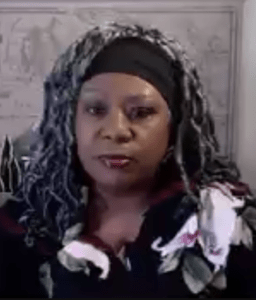
Anthea Butler
Christian nationalists believe Christianity is primarily for white people and that all others must accept the faith on white cultural terms and show a fealty toward the nation, said Butler, author of White Evangelical Racism: The Politics of Morality in America.
Their conviction is that “whiteness is the driving force behind Christianity and America plays a special role in the way Christianity is going to be lived out prophetically.”
The ideology also holds that the U.S. should be an officially Christian nation in order to gain and keep God’s favor, Corbin added. “It’s pretty much the antithesis of the (U.S. Constitution’s) Establishment clause to keep church and state separate.”
While a religious construct for some, Christian nationalism for others is merely a political strategy “that one doesn’t need to believe to execute,” Perry said. He cited Donald Trump “and his surrogates” as examples of those who “don’t necessarily believe any of this but they are very effective” in rallying Christian nationalists to their cause.
About white culture as much as religion
Still, there are many who do believe fervently that the federal government should declare the United States a “Christian nation,” Perry said.
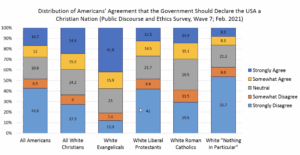 Referencing a February 2020 survey, he said close to 58% of white evangelicals either strongly or somewhat agreed with that statement, compared to just under 30% of white liberal Christians and nearly 40% of all white Christians. Almost 28% of all Americans agreed either strongly or somewhat that the U.S. should be declared a Christian nation.
Referencing a February 2020 survey, he said close to 58% of white evangelicals either strongly or somewhat agreed with that statement, compared to just under 30% of white liberal Christians and nearly 40% of all white Christians. Almost 28% of all Americans agreed either strongly or somewhat that the U.S. should be declared a Christian nation.
And the fact that 16% of the white “nothing in particular” group, or “nones,” shared that sentiment indicates that Christian nationalism can be as much about white culture as it is about white religion, Perry said. “You don’t have to be Christian or evangelical” to believe that America is for “‘people like me, my traditions, my views and my culture.”
Butler noted that Christian nationalism draws in not just the regular churchgoing evangelicals, but what she called “NASCAR Christians” — those who get their dose of prayer, faith and patriotism at major sporting events and other public events.
‘Make America great again’
White Christian nationalism is nothing new in America, the panelists agreed. It can be traced back to Puritan America, to Christian defenses of slavery and to the nationalist Christian fervor during World War I, Du Mez said.
But the form that is more recognizable today emerged from the Cold War era and its reaction to Communism as an anti-family, anti-God and anti-America threat, she said.
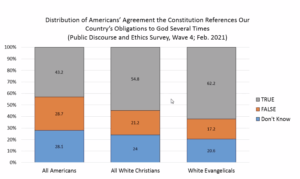 The equating of country and faith that resulted was further entrenched by the challenge posed by the Civil Rights, feminist and anti-war movements of the 1960s. Conservatives came to believe America was “under threat and under siege” and that there was a need “to make America great again,” Du Mez explained.
The equating of country and faith that resulted was further entrenched by the challenge posed by the Civil Rights, feminist and anti-war movements of the 1960s. Conservatives came to believe America was “under threat and under siege” and that there was a need “to make America great again,” Du Mez explained.
The Sept. 11 terror attacks widened the Christian nationalist worldview to see everything outside the nation as a threat, Butler said, and Trump capitalized on that by promising to restore the U.S. to what it was before.
An unhelpful court
Historically, the U.S. Supreme Court has been another factor in the development of white Christian nationalism through rulings permitting religious displays on government property and prayers at official proceedings, Corbin explained. Allowing nativity and Ten Commandments displays on government land equates Christian symbols with patriotic values which is “exactly what white Christian nationalism espouses.”

Caroline Mala Corbin
She added that she doesn’t “anticipate much improvement” with the current high court, given its predisposition to side with Christian businesses on issues such as contraception and LGBTQ discrimination issues.
“I fear this Supreme Court will decide religious liberty cases in a way that flourishes white Christian nationalism” and “allows the more powerful Christian employers to impose their beliefs on others.”
‘A false understanding’
Research also shows that Americans who identify with the beliefs of this ideology largely do not understand the Constitution.

Samuel Perry
A common belief among them is that the nation’s founding documents were inspired by God and that they articulate the nation’s obligations to the Christian faith, Perry said. The more a person affirms white Christian nationalism the more likely they are to hold “a false understanding of what is in the First Amendment.”
The Jan. 6 insurrection was a more open display of those false understandings, Butler said, with the insurrectionists “deciding they could take over instead of elected officials, instead of democracy, instead of everything else.”
But political and religious figures have talked about taking America back long before that event — and with ominous parallels, she added. “These kinds of movements, this kind of fervor, you see in other countries when they begin to fall.”
Butler said she is concerned about similar events occurring around the 2022 and 2024 elections: “We have not seen the last of 1-6.”
Related articles:
More advocates needed to counter Christian nationalism, BJC leader urges
Who knew ‘unalienable rights’ could undermine life, liberty and true happiness? | Opinion by Marv Knox

